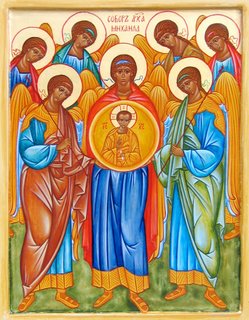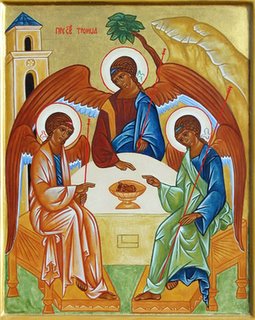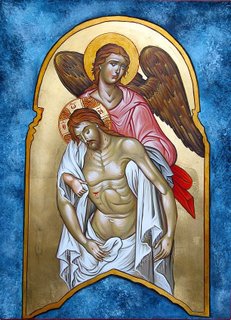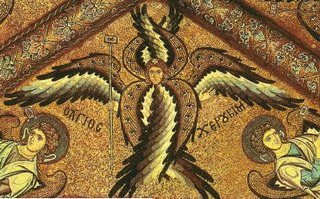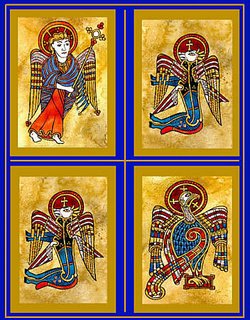Monday, December 04, 2006
Sermon for the First Sunday in Advent
NB
The audio is muffled for about the first 10-20 seconds, but gets clear after that.
The LORD's Eternal Covenant with David
From the Prophet Jeremiah, chapter 33:14-16
14"Behold, the days are coming, declares the LORD, when I will fulfill the promise I made to the house of Israel and the house of Judah. 15In those days and at that time I will cause a righteous Branch to spring up for David, and he shall execute justice and righteousness in the land. 16In those days Judah will be saved and Jerusalem will dwell securely. And this is the name by which it will be called: 'The LORD is our righteousness.'
Stir up Your power, O Lord, and come, that by Your protection we may be rescued from the threatening perils of our sins and saved by Your mighty deliverance; for You live and reign with the Father and the Holy Spirit, one God, now and forever.
Amen.
Collect for the First Sunday in Advent, Lutheran Service Book.
Friday, December 01, 2006
Tuesday, November 21, 2006
Loving and Hating
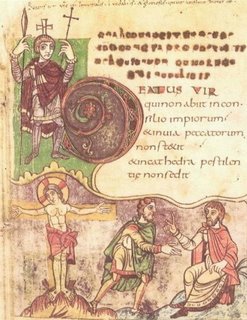
I wonder if the following Luther quote has any significance for participating in ministerial alliances, or "community" Thanksgiving worship services?
We should have nothing to do with evildoers and wicked people. David said, “ I have nothing but hatred for them” (Psalm 139:22). The author of Psalm 1 praises believers who avoid them: “Blessed is the man who does not walk in the counsel of the wicked or stand in the way of sinners or sit in the seat of mockers” (v. 1). If you spend too much time with false teachers, you will eventually share in their false doctrine, lies, and errors. If you play with tar, you’re going to get dirty.
From Martin Luther, Faith Alone: A Daily Devotional, James C. Galvin, general editor.
Tuesday, October 31, 2006
An Interesting Merging of Reformation Day and Election Day
"If you should ask where to place the pope with the papists, either we shall say that they belong in this last group—for they attack and condemn many things they know are good and in harmony with the Word—or we shall simply classify them among the persecutors and opponents of sound doctrine, as the pope is called Antichrist for this reason."*
Here I stand, I can do none other! God help me!
And a very blessed Reformation Day to all!
*Luther, M. (1999, c1960). Vol. 2: Luther's works, vol. 2 : Lectures on Genesis: Chapters 6-14 (J. J. Pelikan, H. C. Oswald & H. T. Lehmann, Ed.). Luther's Works (Ge 12:18). Saint Louis: Concordia Publishing House.
Does Being Lutheran Matter? from Rev. Paul McCain
The movie "Luther" sparked renewed interest in the life and work of Martin Luther. The fact that Concordia Publishing House's movie companion book, Luther: Biography of a Reformer was received so enthusiastically indicates that, if only given a chance, people are eager to learn about Martin Luther and what it means to be and remain genuinely Lutheran. There seem to be three types of responses to the question, "Does being Lutheran matter?" One is, "Are you kidding me? You better believe that it matters! Let me tell you why!" Another response is a sort of "mental shrug" to the question, "Well, of course we want to be and remain Lutheran, that goes without saying, there's no real need to talk much about it though." And then, sadly, there is this response, "It doesn't matter. All that matters is being a Christian. We need to focus on what unites us rather than what divides us." As I watch and analyze events and trends in Christianity and Lutheranism, both in this country and around the world, I am more convinced than ever before of two things. First, being and remaining genuinely Lutheran matters more then ever, and second, the reasons why this is so are unclear at best to many people.
To be Lutheran is to be a person who says, "This is what God's Word, the Bible, teaches. This and nothing else is true and correct. This understanding and teaching and confession of the Gospel of Jesus Christ is the most accurate and most faithful to God's Word. This and none other. Nothing more, and nothing less, will do, for this is the truth." In our day and age these sorts of bold assertions are often met with angry responses, such as, "How dare you insist that Lutheranism is actually the true teaching of God's Word. How can you think you have the truth? All that matters is if a person is sincere about their faith in God." We live in a time when truth is viewed as something relative, impossible to know for sure. The attitude common today is reflected when we hear things like this, "I have my truth. You have your truth. As long as we respect our differences, that is all that matters." It seems today that the most important "truth" for many people is their profound doubt that truth can be known, and equally strong conviction that those who claim to know the truth are wrong.
Before we go further we need to clear up a common misconception. While insisting on the truth of Lutheranism, we can never allow ourselves to do so in an arrogant, haughty or self-righteous manner. People who are passionate about the truth of Biblical Lutheranism know that the Bible teaches often and clearly that we are all sinful human beings in need of God's constant mercy, which He so lavishly gives in Christ. To be truly Lutheran is to receive the gifts of God with humility, repentantly recognizing our great need. It is tempting for Lutherans to be proud and arrogant of their great heritage, but this is a terrible evil! To be Lutheran is to be always mindful of our great sin and our great need for a Savior. To be a Lutheran is to be a sinner calling out to fellow sinners, "Come and see!" Furthermore, we would never want anyone to think that we Lutherans are saying, "We, and we alone, are the only ones who will be in heaven. In fact, you can't be a Christian unless you are a Lutheran." Not so! Not at all. We realize that the Word of God is powerful and active, wherever and whenever it is heard, read or meditated on. There are many Christians in other denominations and churches. They are not Christians because of the errors in their churches, but in spite of those errors. Let's then have none say, "You Lutherans think you alone are Christians." We have never said that, we have never believed it, and we never will. The reason we insist on Lutheranism for everyone who will listen is we believe so passionately that it truly is the most correct and most accurate understanding of the Word of God.
Another point that confuses many people is the fact that there are so many different churches to choose from. It is an awful mess, so it seems. Yes, it can be confusing, but it really is not as complicated as some would think, or want to maintain. Up until the year 1054 there was basically one unified Christian church, distinct from a number of non-Christian or anti-Christian heretical groups. In 1054 the church divided into Eastern and Western Christianity. By the time of the late Middle Ages the Western Church, which had come to be known as the Roman Catholic Church, had reached a point of deep corruption, most importantly in what it believed, but also in the morals and life of the clergy and church leadership. In 1517 there began what we know today as the Reformation, when Martin Luther, a professor and monk in Wittenberg, Germany posted a series of "talking points" on the practice of selling "indulgences" by which people were led to believe they could buy forgiveness of sins, for their dead relatives in purgatory. A person has to decide is the Lutheran view of Christianity is correct, or the Roman Catholic view is correct.
After the Reformation, many groups developed from the teachings of persons other than Martin Luther, most notably, two men: Ulrich Zwingli and John Calvin, who did much of his work in Geneva. These two men and their writings gave rise to many churches that can be traced back to and grouped under the general category of "Reformed" churches. In America in the 19th and 20th century there arose many splinter groups from Reformed churches, these would include "Charismatic" and "Pentecostal" groups, along with groups that rejected all denominations and became, in effect, a denomination of their own, the so-called "non-denominational" churches. And so the question then becomes, "Is Lutheran theology correct, or Reformed theology correct?" So, is it Rome or Wittenberg. If Wittenberg, then is it Geneva or Wittenberg?" Once those decisions are made, the myriad of denominations today makes a lot more sense.
But there is an additional challenge unique to our century and more so the past half-century. Today, despite all their denominational differences and historic confessions, the vast majority of Christian churches in Protestantism have been nearly overwhelmed by the rise of liberal Christianity. This unites them more so than any other feature of their confession of faith. Historic differences are no longer regarded as divisive since these divisions were based on one group's understanding of the Biblical text as opposed to another group's understanding of the Bible. For example, the difference between Lutheran and Reformed views of the Lord's Supper are very important and based on very serious and clear differences in how the words Jesus spoke at the Last Supper are understood. Liberalism however regards the words of Jesus in the Bible as unreliable. It teaches that we can not be sure that what is recorded in the Bible is true and accurate, therefore, there is no point in being "dogmatic" about much of anything having to do with the Bible. Modern liberalism has swept through all Christian denominations, Lutheran Reformed, Protestant and Roman Catholic.
This impacts our question, "Does being Lutheran matter?" for we have to realize that there are many churches in the world today that claim to be Lutheran but have been nearly entirely overcome by liberal views of the Bible. Therefore, they have compromised away the distinct doctrinal position of Lutheranism. They are, in other words, Lutheran really in name only, more by way of tradition than by any real living doctrinal distinctiveness. They may still be fond of historic Lutheranism, but no longer insist that it, and it alone, is true and that other views of the Bible are in error. When we ask the question, "Does being Lutheran matter?" It is a question that must be asked first of those who still use the name Lutheran, but no longer insist on the exclusive truth claims of historic, genuine, authentic Lutheranism. Let's examine the world's largest Lutheran organization, the Lutheran World Federation.
Clear-headed analysis of what is happening in world Lutheranism reveals that the greatest threat to being and remaining genuinely Lutheran comes from groups that call themselves Lutheran! Let's think about the Lutheran World Federation, for instance. No organization in the world has done more in the past fifty years to deconstruct genuine Lutheranism than the Lutheran World Federation. It has tolerated, even encouraged, a loose and unfaithful understanding of the Holy Scriptures and the Lutheran Confessions, all the while ostensibly claiming a certain identity with them. The predecessor bodies that formed the Lutheran World Federation would not reject and throw out false teachers such as Rudolph Bultmann who worked to "demythologize" the New Testament, casting doubt on the words and deeds of Jesus. To this day the Lutheran World Federation pays mere lip service to the ancient Christian creeds, but tolerates in its midst churches whose pastors and theologians doubt, and even very brazenly and openly deny the most fundamental tenets of the Christian faith, casting doubt on the miracles of Jesus, His virgin birth, His bodily resurrection, and so forth! LWF member organizations have embraced the anti-Apostolic and anti-Scriptural practice of the ordination of women, abortion. The large Lutheran state churches are offering same-sex marriages. The LWF, despite its claim that it is Lutheran, does not even insist on absolutely faithfulness to the most basic of all the Lutheran confessions, Martin Luther's Small Catechism. The LWF, and most of its member churches, compromised and walked away from the Lutheran insistence on the Lord's Supper when it entered into all manners of "full communion" with Reformed churches that continue to this day to deny that the bread and wine in the Holy Communion are in fact the body and blood of Christ. The LWF leadership structure has embraced a compromise of the very heart of the Gospel itself with Rome, when it accepted the "Joint Declaration on the Doctrine of Justification" in which it allowed Rome to continue its formal anathema of the Biblical doctrine that we are saved by grace alone, through faith alone, apart from any works.
In our own country, we have seen the devastating consequences of this compromising view of Lutheranism in the Evangelical Lutheran Church in America. It is in full communion fellowship with the most outrageously liberal of one of the most outrageously liberal protestant churches in the world, the United Church of Christ. The UCC does not even insist that its member pastors confess the Holy Trinity! The disaster taking place in the Episcopalian Church in this nation merely is a portend for what the ELCA faces, which only recently had a prominent woman theologian officiate at a homosexual "wedding" service with two women and then shortly after a pastor in their midst do the same for a male couple. Because of the "Concordat" of full communion the ELCA has with the Episcopalian Church USA the newly consecrated homosexual bishop is now, de facto, also a bishop received and recognized by the ELCA. Within our own Synod there is the constant temptation on the part of some to bury their head in the sand and hope and pretend these situations are not taking place or that somehow, perhaps by magic, they will just all go away or that we can ignore these realities and go on with business as usual. These pressures and theological trends also are at work in our own Synod.
Does being Lutheran matter? Many would suggest that to insist on being and remaining Lutheran is to insist on what divides us from other Christians rather than on what unites us with them. "I'm more interested in people being Christian, rather than Lutheran" is a comment one actually hears these days quite often, sadly and tragically, even from Lutheran pastors. Clearly this is a we must be on our guard to avoid. Being Lutheran is not a matter of culture, tradition or habit, at least is should not be simply that. No, being Lutheran is about being passionate about the truth, the full truth, and nothing but the truth as revealed by God in Holy Scripture. As much as we care about the truth of God's Holy Word and the proclamation of a pure and unadulterated exposition of the Scriptures, being Lutheran matters. Martin Luther was concerned that people would be using his name, but then he realized that using the name "Lutheran" was a way to identify with what he stood for, to identify with his confession of the Gospel, in other words, to clearly identify oneself as a person who holds to a specific confession of Christ and none other. There are so many competing points of view of what Christianity is. Being Lutheran therefore is a way to distinguish and teach and confess and bear witness to the Christian faith in a very specific and faithful way.
Being and remaining truly Lutheran takes courage and determination. It is not easy. Faithfulness to the Word of God is never easy, or convenient, or popular. This places unique demands on our pastors and congregations and our church body, since we are determined to be and remain truly Lutheran. Dr. C.F.W. Walther, the first president of The Lutheran Church-Missouri Synod, offers important insight in his masterful study of Lutheranism titled The True Visible Church on Earth. Contrary to our detractors, the Lutheran Church has never claimed to be the only church outside of which there is no salvation. No, not at all. We do believe that the teachings of the confessions of the Evangelical Lutheran Church, the Book of Concord of 1580, are in fact the pure, divine truth, because they agree with the written Word of God on all points. It is for this reason that the Lutheran church, and consequently our Synod, demands of all members, especially of our ministers, that they acknowledge the Lutheran Confessions without reservation and show their willingness to be obligated to them. And it is precisely because we so value and honor the purity of the Gospel given as a gift to us that we stand with Scripture (1 Cor. 1:10; Rom. 16:17) and our Confessions (AC VII; FC SD X) in rejecting every fraternal and ecclesiastical fellowship that rejects the truth of the Lutheran Confessions, either in whole or in part.
This is why we say that being and remaining Lutheran does matter. We Lutherans therefore have no choice but to sound the call for true, orthodox, confessional Lutheranism. We want no poor imitations, but the real thing. We will continue to call for complete faithfulness to God's Word and the Lutheran Confessions, recognizing the blessing that such faithfulness has been since the time of the Lutheran Reformation. Our desire is always to be maximally faithful, not merely minimally so.With this call for faithfulness comes the Lord's call for outreach. In no way must we ever permit ourselves to pit faithfulness against outreach. Faithfulness to the Word results in outreach with the Gospel. Faithful outreach is based entirely on a faithful proclamation of the Word. The constant hallmark of a genuinely Lutheran Synod, and a genuinely Lutheran congregation, is this two-fold emphasis: faithfulness to Scripture and the Confessions, and outreach with the Gospel.
God forbid that we would ever apologize for wanting to be, and remain, a truly Lutheran church, or that we would ever hesitate clearly to speak up when we notice others walking away from the truths of the Word and the Lutheran Confessions for the sake of unity, which is no unity at all, since it is not based on agreement in the teachings of the Word, but only on an agreement to disagree! Thus, we pray that the Lord would continue to strengthen and embolden us to be a true, faithful and courageous Lutheran church body, to the glory of His holy name and the extension of His kingdom.
It is particularly interesting to me how many younger are keenly interested in Lutheranism. They want substance in worship and in Bible study and in every aspect of their church life. They want "authenticity," not the showy and manipulative "hype and hoopla" that their parents and maybe now even grandparents found so alluring in past several decades. They have been raised in a culture that at every turn is trying to manipulate them into buying something. They have had enough of that. They see how shallow it is and they want instead substance and content and rich depth of meaning. This is where Lutheranism excels, for we rejoice in the depths of God's truths, not resting content with simply "once over lightly."
We wonder why, when people have a choice, they leave the Lutheran church. Why bother to remain Lutheran if there is nothing anything worth remaining for? If the differences that distinguish Lutheran from any other option in Christendom are never mentioned, or made to appear no more important than picking amongst various ice cream flavors, is it any wonder why people leave our congregations to find "greener pastures" in other churches? That is why the constant challenge we face is gently, pastorally, warmly and winsomely to be working hard at reinforcing good understandings and encouraging careful thinking and reflection, helping our people to see the issues of our day, and thereby recognizing and appreciating the fact that Lutheranism is the best option for anyone who wants to remain genuinely faithful to God's Word.
So, how does one remain Lutheran? Fond hopes, fervent wishes, pious prayer. Yes, all that, but more. The old Benedictine motto: "Ora et labora" applies! Pray and work and then, pray and work some more. Teaching is key. We must disciple people into the truth. This involves long, hard work. Passion, energy, excitement, dedication, enthusiastic desire to pass along the truth-these are key to being and remaining Lutheran. Nothing is more exciting than the truth, and if that is so, shouldn't our attitude toward it be equally one of excitement and energy and conviction? If Lutheranism appears to be dreary, dull and plodding whose fault is that but ours? High-quality intensive teaching is the key to the future of Lutheranism. We sing, "Lord, keep us steadfast in Your Word" and then we work to make it so among us, for our sake and for the sake of those who will come after us.
Does being Lutheran matter? Yes, it matters. It matters as much as being and remaining true to Christ and His Word and Sacraments matters, as outreach with the Gospel matters, and as loving our neighbor matters. Our great privilege is helping all those whom we can, be and remain genuinely Lutheran, for that is to be nothing more, and nothing less, than true to Christ and His Gospel. To that end, may God bless our efforts, and may He guide our work together in this high calling and noble task-being and remaining Lutheran.
Monday, October 30, 2006
Happy Reformation Day!

On this Reformation day I will be wearing my Reformation red t-shirt that boldly states that Luther is indeed my "homeboy." One of my professors at the seminary asked what a "homeboy" was.
Noun
1.
homeboy - a fellow male member of a youth gang
member - one of the persons who compose a social group (especially individuals who have joined and participates in a group organization); "only members will be admitted"; "a member of the faculty"; "she was introduced to all the members of his family"
2.
homeboy - a male friend from your neighborhood or hometown
acquaintance, friend - a person with whom you are acquainted; "I have trouble remembering the names of all my acquaintances"; "we are friends of the family"*
I think he was glad that I am so down with Luther.
*Luther may be my homeboy, he was a man who was saved by grace alone through faith alone in Christ alone, just like me. Christ, however, is not my "homeboy." He is the Lord of Life, the King of the Universe, the Son of God and Mary's Son, a He is the Alpha and Omega, etc. He is in a whole different class than "homeboy" and to call His such is disrespectful and borderline blasphemous. Just a little FYI.
Sermon for Reformation Sunday 2006
Friday, October 13, 2006
The Questions...
I’m sure at different times you have heard at least one of these questions. In truth, they are good questions that show an intention and desire to serve God and His Church faithfully. But, what are the answers? I’ve spent a lot of time thinking about answers to these and similar questions. I’ve anguished over many of them to no avail. But are these the questions we need to be focusing on?
St. Paul was a missionary of great effectiveness. He engaged all kinds of people in ministry. What was his formula for success?
When I came to you, brothers, I did not come with eloquence or superior wisdom as I proclaimed to you the testimony about God. For I resolved to know nothing while I was with you except Jesus Christ and him crucified. I came to you in weakness and fear, and with much trembling. My message and my preaching were not with wise and persuasive words, but with a demonstration of the Spirit's power, so that your faith might not rest on men's wisdom, but on God's power. (I Corinthians 2:1-5)
Huh, maybe the answer is not the problem after all. Maybe it’s the questions, all of which focus on OUR work, that pose the real stumbling block. We don’t do anything, we come in weakness before the Lord and He gives us the answer: Christ and him crucified!
And why is that the answer? So that you faith might not rest on men’s wisdom, but on God’s power.
Next time your up in the middle of the night pondering what you can do as a Pastor, elder, District President, lay person, to fix the Church and make it prosperous, look to Christ crucified for you answer. It’s there nailed to the tree.
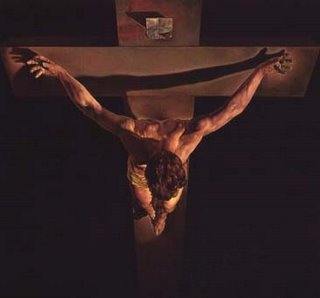
Wednesday, October 11, 2006
Chasubles
A chasuble, called a phelonion in Orthodox churches today, and a φελονης in 2 Timothy 4:13, is an ornate circular garment with a hole in the center for the wearer’s head. When worn, it reaches to the wearer’s wrists, so that if the wearer holds both arms straight out, the chasuble forms a semi-circle when viewed from the front or the back. The chasuble is the descendant of a first-century paenula that was worn as a coat by both sexes. Today it connotes solemnity and formality. The chasuble can be worn by the celebrant during a Eucharistic (communion) service. Sometimes the celebrant puts the chasuble on over other vestments as part of the Eucharistic ceremony. Chasubles are used in Lutheran churches, particularly outside the United States, as well as in Anglican and Roman Catholic churches.
The chasuble is always worn with a stole. Generally, the stole is under the chasuble. The stole and chasuble combination is the first-century equivalent of wearing a necktie and jacket. It is not appropriate to wear a chasuble in a service that does not include Communion (except for Good Friday and Holy Saturday services).
The Roman Empire had two modes of execution: non-citizens were thrown to wild animals, but citizens were beheaded with the sword. Therefore when Paul says that he escaped the lion’s mouth in 2 Timothy 4:17, he means he had successfully proved his Roman citizenship. In 2 Timothy 4:13, most translations vaguely refer to a garment or a cloak, but in the Greek, Paul asks Timothy to bring him the chasuble he had left behind in Troas. Since the chasuble was the mark of a Roman citizen, Paul apparently wanted to go out like one.
Therefore, when the celebrant is dressed in a chasuble, he is dressed like a Christian martyr who is ready to have his head chopped off for Christ.


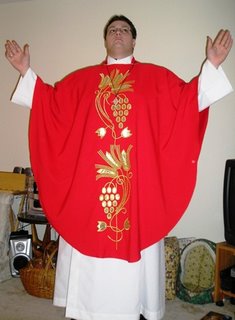

Monday, October 09, 2006
Sermon for Pentecost 18
Mark 9:30-37 (English Standard Version)
Jesus Again Foretells Death, Resurrection
They went on from there and passed through Galilee. And he did not want anyone to know, for he was teaching his disciples, saying to them, "The Son of Man is going to be delivered into the hands of men, and they will kill him. And when he is killed, after three days he will rise." But they did not understand the saying, and were afraid to ask him.
Who Is the Greatest?
And they came to Capernaum. And when he was in the house he asked them, "What were you discussing on the way?" But they kept silent, for on the way they had argued with one another about who was the greatest. And he sat down and called the twelve. And he said to them, "If anyone would be first, he must be last of all and servant of all." And he took a child and put him in the midst of them, and taking him in his arms, he said to them, "Whoever receives one such child in my name receives me, and whoever receives me, receives not me but him who sent me."
Friday, September 29, 2006
Another Year for Thanksgiving to God for a Great Life.
My Lord and my God, in You alone I live and move and have my being. Today I again mark the day of my birth and the beginning of my temporal life. In deep gratitude I also recall my spiritual birth in the waters of Holy Baptism as You reconciled me to Yourself and cleansed me of my sin. For all this I thank and praise You. This day reminds me, to Your praise, O God, my Creator, that I was not only born into this world, but also that You have bought me to a place where Your name is truly known, Your Word is taught in purity, and where, by Your means of grace, true faith is kindled. I thank You for the benefits that You have showered upon me, both for my life here and for my life yet to come, from the day of my birth to this very hour. You have nourished me and kept me. By Your holy angels, You have protected my life in ways I can hardly imagine, and You have provided my bodily needs of food, clothing, and shelter in rich measure. To this grace upon grace You have added Your Word, through which You deliver forgiveness, comfort, and peace for each day of my life. How wonderful are the works of Your hands, O Lord, and Your mercy rich beyond measure!
Let me never be mindful of my sinful beginning and my well-deserved punishment. But You have sought me out, the lost sheep; You have redeemed me, sanctified me, comforted me, governed me, and preserved me in my calling. Daily grant me forgiveness of sins as well as steadfastness in saving faith all the days You have prepared in advance for me, that I may serve You in true faith. In Jesus' name I pray. Amen.
St. Michael and All Angels
On the Feast of Michael and all Angels, popularly called Michaelmas, we give thanks for the many ways in which God's loving care watches over us, both directly and indirectly, and we are reminded that the richness and variety of God's creation far exceeds our knowledge of it.
The Holy Scriptures often speak of created intelligences other than humans who worship God in heaven and act as His messengers and agents on earth. We are not told much about them, and it is not clear how much of what we are told is figurative. Jesus speaks of them as rejoicing over penitent sinners (Lk 15:10). Elsewhere, in a statement that has been variously understood (Mt 18:10), He warns against misleading a child, because their angels behold the face of God. (Acts 12:15 may refer to a related idea.)
In the Hebrew Scriptures, it is occasionally reported that someone saw a man who spoke to him with authority, and who he then realized was no mere man, but a messenger of God. Thus we have a belief in super-human rational created beings, either resembling men in appearance or taking human appearance when they are to communicate with us. They are referred to as "messengers of God," or simply as "messengers." The word for a messenger in Hebrew is malach, in Greek, angelos, from which we get our word "angel" [Digression: angelion means "message, news" and euangelion means "good news = goodspell = gospel," from which we get our word "evangelist" used to mean a preacher of the Good News of salvation, and, more narrowly, one of the four Gospel-writers: Matthew, Mark, Luke, and John.]
By the time of Christ, Jewish popular belief included many specifics about angels, with names for many of them. There were thought to be four archangels, named Michael, Gabriel, Raphael, and Uriel. An alternative tradition has seven archangels (see Tobit 12:15 and 1 Enoch 20). Sometimes each archangel is associated with one of the seven planets of the Ptolemaic system (the moon, Mercury, Venus, the Sun, Mars, Jupiter, Saturn). Michael is associated with Saturn and Uriel with the Sun. The other pairings I forget, but I believe that you will find a list in the long narrative poem called "The Golden Legend," by Henry Wadsworth Longfellow. (I believe that a pairing is also offered in the opening chapters of the Proof of the Apostolic Preaching, by Irenaeus of Lyons, but I have not the work at hand.)
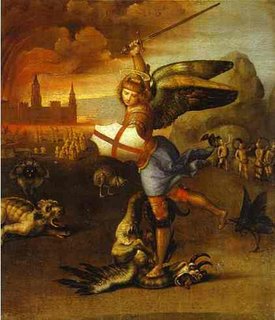 Michael (the name means "Who is like God?") is said to be the captain of the heavenly armies. He is mentioned in the Scriptures in Daniel 10:13,31; 12:1 (where he is said to be the prince of the people of Israel); in Jude 9 (where he is said to have disputed with the devil about the body of Moses); and in Revelation 12:7 (where he is said to have led the heavenly armies against those of the great dragon). He is generally pictured in full armor, carrying a lance, and with his foot on the neck of a dragon. (Pictures of the Martyr George are often similar, but only Michael has wings.)
Michael (the name means "Who is like God?") is said to be the captain of the heavenly armies. He is mentioned in the Scriptures in Daniel 10:13,31; 12:1 (where he is said to be the prince of the people of Israel); in Jude 9 (where he is said to have disputed with the devil about the body of Moses); and in Revelation 12:7 (where he is said to have led the heavenly armies against those of the great dragon). He is generally pictured in full armor, carrying a lance, and with his foot on the neck of a dragon. (Pictures of the Martyr George are often similar, but only Michael has wings.)
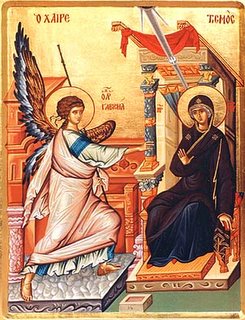 Gabriel (the name means "God is my champion") is thought of as the special bearer of messages from God to men. He appears in Daniel 8:16; 9:21 as an explainer of some of Daniel's visions. According to the first chapter of Luke, he announced the forthcoming births of John the Baptist and of our Lord to Zachariah and the Virgin Mary respectively.
Gabriel (the name means "God is my champion") is thought of as the special bearer of messages from God to men. He appears in Daniel 8:16; 9:21 as an explainer of some of Daniel's visions. According to the first chapter of Luke, he announced the forthcoming births of John the Baptist and of our Lord to Zachariah and the Virgin Mary respectively.
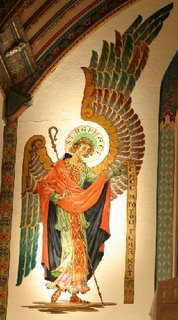 Raphael (the name means "God heals") is mentioned in the Apocrypha, in the book of Tobit, where, disguised as a man, he accompanies the young man Tobias on a quest, enables him to accomplish it, and gives him a remedy for the blindness of his aged father.
Raphael (the name means "God heals") is mentioned in the Apocrypha, in the book of Tobit, where, disguised as a man, he accompanies the young man Tobias on a quest, enables him to accomplish it, and gives him a remedy for the blindness of his aged father.
 Uriel (the name means "God is my light" -- compare with "Uriah", which means "the LORD is my light") is mentioned in 4 Esdras.
Uriel (the name means "God is my light" -- compare with "Uriah", which means "the LORD is my light") is mentioned in 4 Esdras.
It is thought by many scholars that the seven lamps of Revelation 4:5 are an image suggested by (among many other things) the idea of seven archangels.
What is the value to us of remembering the Holy Angels? Well, since they appear to excel us in both knowledge and power, they remind us that, even among created things, we humans are not the top of the heap. Since it is the common belief that demons are angels who have chosen to disobey God and to be His enemies rather than His willing servants, they remind us that the higher we are the lower we can fall. The greater our natural gifts and talents, the greater the damage if we turn them to bad ends. The more we have been given, the more will be expected of us. And, in the picture of God sending His angels to help and defend us, we are reminded that apparently God, instead of doing good things directly, often prefers to do them through His willing servants, enabling those who have received His love to show their love for one another.
Everything You Never Wanted to Know about Angels
The major post-New-Testament source for Christian ideas about angels is a writer (probably a fifth-century Syrian monk) who signed himself "Dionysius the Areopagite." His writings were taken to be those of a convert of the Apostle Paul, mentioned in Acts 17:34. Accordingly, when he wrote on angels (or any other theological subject), he was assumed to know what he was talking about. His writings had a considerable influence on the portrayal of angels in art and in the popular imagination.
What is a seraph?
Seraphim are mentioned in the Bible in Isaiah's vision of the heavenly throne-room (Is 6:1-7), where the LORD is seated between two seraphim. (In Hebrew, most masculine nouns form the plural by adding "-im".) Each has six wings, and with two he covers his face, and with two he covers his feet, and with two he flies. Later writers identify these functions with poverty, chastity, and obedience. Poverty, in that he veils his face, a sign of humility. Chastity, in that he covers his feet, a standard Hebrew idiom (or euphemism) for the lower body, including the crotch. Obedience, in that he flies to carry out whatever commission he receives from God. The word "seraph" comes from a root meaning "to burn", and the word is used in Nu 21:6,8; Dt 8:15; Is 14:29; 30:6; where it is translated "fiery serpent." Probably the Hebrews pictured a seraph as a kind of fiery winged serpent or reptile.
What is a Cherub?
Cherubim are first mentioned in the Bible in Gen 3:24, where Adam and Eve are expelled from the Garden, and two cherubim are set at the gate to guard it, so that no one may enter. The Psalmist says of God:
He rode upon a cherub, and did fly; he came flying on the wings of the wind. (18:10)
thou that dwellest between the cherubim (80:1)
he sitteth between the cherubim; let the earth quake (99:1)
From this we infer that they were pictured and thought of as winged creatures flanking or supporting the throne of God.
Ancient Middle Eastern art regularly shows the throne of a king or a god flanked by, or sometimes resting on, two creatures. Typically, each creature has the body of a lion or a bull (often the front quarters of a lion, with claws, and the hind quarters of a bull, with hooves, or vice versa), the head of a man, and the wings of an eagle. We see these creatures, not only flanking a throne, but also flanking the gate or doorway of a city or a temple. They appear to be standard figures, performing the function of honor guards or that of guard dogs.
In Ex 25f and 36f, the Israelites are to make a chest called the Ark of the Covenant, and place on the lid statues of two cherubim, with their wings arching over and meeting in the middle. Aside from the fact that they had wings, we are not told anything about their appearance. It was apparently taken for granted that the Israelites already knew what a cherub was supposed to look like. It is a reasonable guess that they looked like the guard figures already standard in Middle Eastern art, as noted above.
The Ark represented the presence of God, and presumably the Israelites thought of the cherubim as guarding or flanking or supporting an invisible throne. Thus, the Ark gave two complementary messages. On the one hand, it said, "The LORD cannot be represented by a picture or statue. He is spirit, He is invisible. He is transcendant. The whole universe cannot contain Him." On the other hand, it said, "Here is the place where the LORD chooses to reveal Himself. This is the place toward which you are to direct your homage, this is the focus of your worship."
The prophet Ezekiel records two visions (Ez 1 and 10) in which the LORD appears to him, enthroned above four figures identified as cherubs. Each is said to have four faces, one facing in each direction, the face of a man, a lion, a bull, and an eagle.
Wednesday, September 27, 2006
Maybe I'm a little over-confident...but
So, here they are.

Advent Stole, Behold, the Lamb of God who takes away the sin of the world! The star that guided the wise men to the Christ.
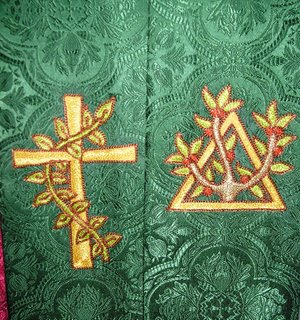
The vine that comes from the Branch of the Cross, new growth and the fruits of faith that comes from our baptism and the name of the Triune God.
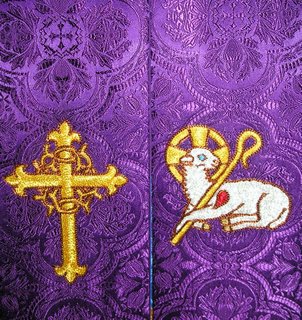
The suffering and humiliation of Christ's Passion, a Lamb before the slaughter. I really like the parallel between this stole and the advent stole.
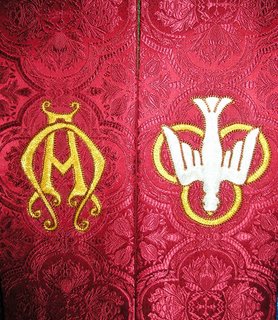
The Beginning and the End, the Holy Spirit descending in the symbol of the Trinity.
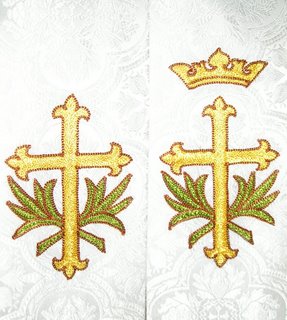
I like these two almost mirror images. The right cross is for the new-born Christ, with His Passion and Resurrection before Him, the left cross signifies His Easter Triumph over death, the devil and the grave.
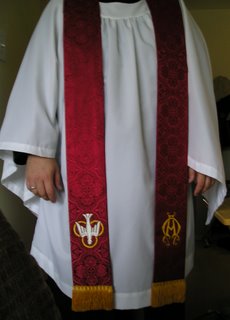
Front view of the red stole.
Tuesday, September 26, 2006
An Insider's Look at the Peaceable Religion of Islam
I found it very enlightening and frightening. Let us pray, as worshippers of the cross and Jesus, the Christ who gave His holy life that we might live on that cross, that God would melt the wicked hearts of stone of these enemies of the true, Triune God.
I am a Missouri Synod Lutheran chaplain. I have been on Active duty almost continuously since May of '04, first in Baghdad, then New Orleans, and now back in Baghdad (with a few months off for good behavior). Before that I was a dual parish pastor in Kansas for seven years, and before that for a dual parish in Nebraska for over 16 years.
I can footnote many of the comments I made, although I did not bring my library of books with me that contains some of the information that shaped my critique. However, I can assure you, that if a Muslim reads what I wrote, you can expect passionate denial or scorching invective. The denial may be honest, because many Muslims are as knowledgeable about Islam as many Christians are about Christianity. Also, since most cannot read the Koran (it must be read in Arabic to be authentic), they must rely on what their imams or mullahs tell them. On the other hand, the denial may be just another example of what I mentioned in my response: that a Muslim can look you in the eye and lie or twist what is true and think nothing of it.
I won't speak for the Jews here, but I can assert unequivocally that Muslims do, by and large, claim that Muslims and Christians worship the same god. I am in Iraq, where I rub elbows with Muslims. Spent some time in Jordan also . I have read hundreds of pages of Muslim propaganda and dogma. Almost every Muslim with whom I have a lengthy and serious discussion will bring up "how close we Muslims and you Christians really are in what we believe about God." One of their claims for authenticity and respect is just that they are just another brand of Abrahamic faith, chips off the same monotheistic block.
Popes, presidents, reporters, and politicians have bought that sale of goods in the interest of fostering good will with a religion that has pledged the destruction of all that which these new found friends of Islam hold dear. I suspect that many Muslims laugh in their sleeves at how gullible politically correct westerners are. One thing is for sure. In Islamic dogma it is not only permissible, but advisable, to lie to the "dogs" who desecrate Allah's world and dishonor Allah's faithful followers. So, they can look you in the eye, say with a straight face, "Allah and Jehovah are just two names for the same merciful and compassionate Lord," and "Islam means you no harm. Instead, we bring a fresh choice for world peace."
Mohammed, in the grand tradition of Joseph Smith, Mary Baker Eddy, Judge Rutherford, and, my favorite, L. Ron Hubbard, invented his "god" and theology out of scrap parts he found in theological junk yards. There is money to be made hawking "the better life," as his Allah sanctioned raids on helpless villages and caravans later proved. After all, who can argue with a bank robber and rapist whom God has certified as a faithful servant and confidant? Of course, to appeal to a somewhat Christian audience, one must incorporate just enough Jesus and Bible lingo and pious sounding schmooze to be minimally attractive. The historical records about Mohammed show that he tried a rapprochement with [heretical, no less] Nestorian Christians, using that canard about "we all worship the same, one, true God." In cosmic irony, they threw him out as a heretic (hence future surahs from "God" would revoke (abrogate is the word they use) his earlier benign tolerance of Christians.) Islam is, in my professional judgment, and shared by many, a Christian heresy, along the lines of Arianism: jam the "desirable" aspects of Christianity through a meat grinder, along with heavenly sounding spices and some "high-fallutin'" philosophical fillers to make sausage that is neither Christian nor honest.
By the way, "Allah" was a junior god in the Arab pantheon, one of many gods Mohammed and his family worshipped until he saw how the worship of one god had apparently unified the west (he was not a good historian either). Allah was his particular favorite. (Fun fact: Allah had two daughters that Mohammed almost entirely removed from his "revelations" from Allah, that did, however survive in the infamous "Satanic Verses.") The rest of the family didn't appreciate his rejection of their favorite gods, nor his goofy half-baked theory of monotheism, so they threw him out on his ear (which then led "God" to reveal some surahs to Mohammed in the Medinan exile to curse those idol worshipping miscreants of Mecca and doom them to the typical Muslim "peace" process.)
Also, Muslims like to use the old "King James Bible Trick" when you quote the Koran. If you say, "The Koran says such and such," they will always categorically, and again, with a straight face, say that it does not. Only a few might explain. "Allah didn't speak English." (That corresponds to, "If it ain't in the King James Bible or said with King James thee's and thou's, it ain't authentic."). So, the only way you can say that the Koran says this or that is if you actually use Arabic vocables.
But even then you are not home free, because the interpretation of the Koran is fraught with many grammar and document errors (which, again, a Muslim will categorically deny is possible,) that has resulted down through the years in some entertaining or confusing interpretation possibilities.
Then, just to make things fun in a debate, if you get across the first two moats, most Muslims will be quick to point you to passages in the "Meccan" surahs, which are, indeed, irenic, while downplaying the strident "Medinan" surahs about cutting necks and other acts of brutal public service performed on behalf of Allah, the merciful and compassionate, on folks that don't see things his way--much like the "modernist" liberal Christian crowd downplays "embarrassing" portions of Scriptures, such as Jehovah commanding Joshua to slaughter the Palestinians--man, woman and child, or the sayings "attributed" to Jesus that denounce Jews, or Paul denouncing homosexuality.
Then, just when it seems you are making headway, it turns out that the Koran isn't what drives most of Muslim faith and life anyways (which reads about as well as the Book of Mormon), but rather the sayings of Mohammed (May He Rest In Peace.) That's a roller coaster ride that makes Cedar Pointe a schoolyard playground by comparison. In many ways, debating with a Muslim is as exhilarating as an afternoon with five Jehovah's Witnesses or following Alice through the looking glass!
Wednesday, September 20, 2006
Bottom line...there is only one true religion and Christ is at its center.
Tuesday, September 19, 2006
All things to all people…or a convenient excuse for questionable living?
So many times I have heard people who serve in the church use this quotation to endorse and support wildly differing and often questionable worship practices and lifestyles. If a culture places high value on a certain musical style, then let’s use that style in all of our hymns. If a certain culture “feels” threatened by vestments and clergy shirts, let's wear polos and khakis. If a certain culture is uncomfortable with Jesus’ ethnicity, let's change it, if I certain culture is uncomfortable with Jesus’ gender, why not change that too?
I wonder if maybe the real crux of Paul’s statement here is not a wholesale rejection of all Christian tradition and doctrine, but rather a joyful proclamation that Christ is the answer for all things. If you are weak, He is strong. Where you are sinful, He is righteous. Where you are lacking, He is sufficient. And it is His fullness, His righteousness, His obedience that becomes a part of us through His Word, His Sacraments, His Church. Remember, it was also that blessed Apostle and brother who said “for it is God who works in you to will and to act according to his good purpose.”
It is important, especially as pastors, to test your motives against the whole counsel of God. If you find yourself defensively throwing out the same scripture over and over again to defend your actions, it may be wise to examine your heart and turn in obedience to the will of God.
Monday, September 18, 2006
Religious Terrorism
"We tell the worshipper of the cross (the Pope) that you and the West will be defeated, as is the case in Iraq, Afghanistan, Chechnya" said a Web statement by the Mujahideen Shura Council, an umbrella group led by Iraq's branch of al Qaeda.
"We shall break the cross and spill the wine ... God will (help) Muslims to conquer Rome ... (May) God enable us to slit their throats, and make their money and descendants the bounty of the mujahideen," said the statement, posted on Sunday on an Internet site often used by al Qaeda and other militant groups.
Now is that violent or not? Christians must be ready for more accute and widespread violence and persecution as Muslim violence and hatred increases against us. Unfortunately, given previous comments on this very blog site, I fear we may also face persecution from militant Judaism.
May God help us and may this time of tribulation be short so that we, His elect, may survive!
Come, Lord Jesus!
Saturday, September 16, 2006
Bound in our Freedom.

God has given us freedom in Christ. That is a remarkable and wonderful gift. A gift that He gives freely and a gift that truly frees us. However, some would take that good gift and pervert it. Some would take the freedom we have in Christ and try to bind us with it, to make us slaves, no longer to the Law of God, but to the freedom He has given us!
How often is the plea made, “We have freedom in the Gospel”? How often is that plea made to justify some unusual practice in worship, or to promote the ordination of women, or the acceptance of a homosexual lifestyle? How often is that plea made with the intention of binding and alienating all detractors? “Our worship practice has implications for our doctrine and theology…” “WE HAVE FREEDOM!! in the gospel.” “God’s Word is very clear that women should not…” WE HAVE FREEDOM!...in the gospel.” “Homosexuality is clearly not…” “WE HAVE FREEDOM!”
Where’s the Gospel?
The next time you are shut down for being conservative, the next time you are made to feel like the devil for demanding faithfulness to God’s Word, the next time someone tries to bind you with some alien freedom, remember this, “For though I am free from all, I have made myself a servant to all…” (I Cor. 9:19a)
Thursday, September 07, 2006
UPDATED POST
I thought it would be good to illustrate a way in which the use of artwork, especially iconography, can be beneficial in Lutheran devotional life.
Also, always consider art in your churches. There will be times when, as hard as it may be to believe, the pastor will have a boring, or even bad sermon. It is at these times godly and scriptural art can redirect the sinful man to focus on Christ, the Word made flesh. If you see something in your church that you don't understand, ask someone about it! This includes all vestments, paraments, banners, symbols and colors on said vestments, paraments and banners, and even bulletin covers and Hymnal covers (the LSB has a beautiful and subtle reminder of Word and Sacrament as well as the mystery of the Trinity!)
Another Golden Aardie
Wednesday, September 06, 2006
Jesus Alone? Sounds good, right? Maybe not...
Stephen Prothero, American Jesus: How the Son of God Became a National Icon. Page 79.
This is a brief excerpt from a book I am reading for Christology. I haven’t had the class yet, but I could not wait to read this intriguing book. What is so interesting about the above excerpt is the total disconnect between the Word and the Incarnate Word. This is something liberals like to do, divorcing Jesus from Himself by denying the power and authority of the Word.
John 1:1-5
Tuesday, September 05, 2006
Why can't we all just...

“Why can’t we just get along?”
An alluring question, isn’t it? A question that always seems to be asked in times of conflict. A question that is asked by people who are willing to go to great lengths to have a form a peace. A question that was on the marquee of a United Church of Christ in Des Peres, Missouri.
I saw this sign on the way to work last week. Now, in general, I’m not a big fan of those cutesy signs. I usually think they are pretty corny and more than a little pathetic. But this one was more than corny or pathetic; it was totally revolting to me.
Why is that? I don’t think the Holy, Catholic Church of Christ should ever ask such a simplistic and, frankly, retarded question. There is a reason we can’t all get along, that reason is truth. Christ is the Truth. When we are confronted, as Christians, with anything that opposes Christ, i.e., Islam, Judaism, Hinduism, or the UCC, we cannot get along. We are sanctified only in the Incarnate Word of Truth and when presented with anything other than that holy and life-giving Word, there is no unity and no “getting along.”
So what is the answer to “why can’t we all just get along?” Because we are not all in Christ, because we are all sinful, because the time for that has not come. We cannot all get along because there is great evil in the world and that evil sets itself against Christ and His Church.
New Icon
Today I got a new one that I ordered from e-Bay. It is called "deisis." Deisis is from the Greek for prayer, as is described below. When I look and meditate upon the beauty of this man-made work of art, it makes me think of the faithfulness of Christ's holy servants, the Blessed Virgin and St. John, Baptizer and Forerunner.
The Origins of This Image
One of the most important architectural features of Orthodox churches is a screen called the iconostasis (accent on the third syllable) that separates the sanctuary, where the altar is located, from the congregation in the nave. This screen consists of several horizontal rows of icons. In early Byzantine times, the iconostasis consisted of a single panel or sometimes a triptych of the Savior, the Virgin Mary, and John the Baptist called the Deisis. The word in Greek means "prayer," and is pronounced "dee’-sis." By the 13th century in Russia, many more icons were added but the Deisis remained the centerpiece.
This icon we have reproduced for you is from an ancient Byzantine pattern, probably at least 1400 years old, dating from a time in which it would have been the focal point for the eyes of worshipers during the Eucharistic Sacrifice, providing for them a visual counterpart to the sacred scripture: "This is my body, given up for you."
Theology and Symbolism
Christ is seated on His heavenly throne, right hand raised in benediction and left hand resting on the Bible, open to the words (in Greek) from the Gospel of John, "I am the way, the truth, and the life." (John 14:6) He is dressed in a tunic of red, signifying His humanity and His blood shed for us. Over the tunic He wears a robe or hymation of blue, signifying His divinity with the blue of Heaven. Christ’s halo, the iconographic symbol for sanctity, is inscribed with a cross and the Greek letters omicron, omega, nu, spelling "HO ON." In English, this becomes "Who Am," the name used for God in Exodus 3:14.
Mary wears a homophorion, or combined veil and mantle over her dress. It is adorned with three stars on the head and shoulders. These are symbolic of Mary’s perpetual virginity; before, during, and after her Son’s birth. In 431 AD, the Council of Ephesus officially declared that Mary is the Theotokos, or "God Bearer," she who provides the vital link between the divinity of God and humanity. Her pose in this icon with head inclined toward Jesus and hands extended communicates of submission to Christ and directing other to look only to Christ, her divine Son.
John the Baptist is usually referred to by Orthodox Christians as John the Forerunner. In iconography, he is always represented with long, unkempt hair in keeping with his life in the wilderness. Sometimes he is dressed in hairy garments with a leather belt as in Matthew 3:4, and sometimes in classical robes as in this image. John is included in the Deisis because of his role foretold in Isaiah 40:3, "A voice cries out: In the wilderness prepare the way of the Lord." Like Mary, his pose is one of prayerful supplication.
Above the figures are abbreviated inscriptions in Greek that name each person. The letters above Mary stand for Meter Theou, Mother of God, those above Jesus represent Iesous Khristos, Jesus Christ, and the letters above John translate as "St. John the Forerunner."
icon explanation from http://www.printeryhouse.org/mall/Icons/Saints/m01.asp
Back to School

Ok, it's finally here. My last first day of school! For 21 (23 if you count preschool!) years I have had a "first day of school."
I don't know if you got jitters in your stomach on the first day, but I always did and still do. You'd think I'd be used to this by now, but it still makes me nervous. Do I have everything I need? Will the teachers be nice? Will my classmates be nice? Will I do well?
In times like this, Jesus' words always bring me comfort, "Therefore I tell you, do not worry about your life, what you will eat or drink; or about your body, what you will wear. Is not life more important than food, and the body more important than clothes? Look at the birds of the air; they do not sow or reap or store away in barns, and yet your heavenly Father feeds them. Are you not much more valuable than they? Who of you by worrying can add a single hour to his life?
"And why do you worry about clothes? See how the lilies of the field grow. They do not labor or spin. Yet I tell you that not even Solomon in all his splendor was dressed like one of these. If that is how God clothes the grass of the field, which is here today and tomorrow is thrown into the fire, will he not much more clothe you, O you of little faith? So do not worry, saying, 'What shall we eat?' or 'What shall we drink?' or 'What shall we wear?' For the pagans run after all these things, and your heavenly Father knows that you need them. But seek first his kingdom and his righteousness, and all these things will be given to you as well. Therefore do not worry about tomorrow, for tomorrow will worry about itself. Each day has enough trouble of its own. (Matthew 6:25-34)
The Apostle Paul's exhortation to "not be anxious about anything, but in everything, by prayer and petition, with thanksgiving, present your requests to God." (Philippians 4:6) also eases my soul.
God's Word is beautiful!
Wednesday, August 30, 2006
Dinner Problems
Can you believe how rude these people are?
That’s what I’ll do! No one, not even God Himself, has the right to deny me a personal relationship between me and my stomach! And, if some rude person dares to serve some food that I am deadly allergic to, I will also be within my rights to sue them! HA HA!! I think I’ve stumbled upon something great here. I mean, it works in the Church, why not for me?
Tuesday, August 29, 2006
Hmmm...it looks like Luther wasn't the first.
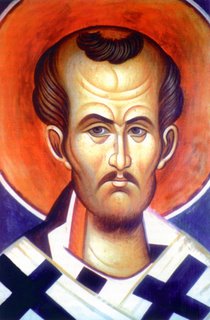
I think it is obvious that Luther did not create a new religion or a new observance of Christianity with his nailing of the 95 Theses. He was simply the vessel through which God called by grace His holy catholic church back to orthodoxy. This was emphasized for me by Pr. William Weedon.
Patristic Quote for the day from Pastor Weedon:
What does this mean? That he has justified our race not by right actions, not by toils, not by barter and exchange, but by grace alone. Paul, too, made this clear when he said: “But now the justice of God has been made manifest apart from the Law.” But the justice of God comes through faith in Jesus Christ and not through any labor and suffering. -- St. John Chrysostom, *Against Judaizing Christians* Discourse VII:III 2
Thank you Brother Chrysostom and thank you Brother Weedon!
Friday, August 25, 2006
Shake off the dust...Law and Gospel Evangelism

Matthew 10:14
And if anyone will not receive you or listen to your words, shake off the dust from your feet when you leave that house or town.
Mark 6:11
And if any place will not receive you and they will not listen to you, when you leave, shake off the dust that is on your feet as a testimony against them.
Luke 9:5
And wherever they do not receive you, when you leave that town shake off the dust from your feet as a testimony against them.
Evangelism is important. It is the comission to the Church to go and make disciples of all nations, baptizing them in the name of the Triune God. For some reason I was thinking about evangelism today, especially evangelism in light of the above mentioned verses.
Jesus tells His disciples in three of the gospels to “shake off the dust from their feet” as a testimony against anyone who will not receive them as servants of the Gospel or listen to their words of salvation.
But what does this mean for evangelism? How does this form our response to those who do not receive the Word of Eternal Life? Should we give up after one try? How do we apply the law in evangelism?
These are things I have never thought of before. I think we do need to apply the law to those who refuse the gospel, but how do we do that? I would appreciate any thoughts on these things.
Some Reflections
It was the winter quarter of my first year. My wife and I had been invited by the second year field worker at our assigned congregation and his wife to have dinner and spend the evening together. The specific details of the conversation are now vague to me, but the second year guy and I started to talk about things of a theological nature. Before I knew it he was accusing me of being a theologian of glory! I was quite upset by this, even though I wasn't entirely sure what it meant. I have since learned the difference between the two theologies and with God's help and work in my life, I am able to preach and teach a theology of the cross. But I have learned something very important over my 3 + years in the seminary: NEVER ASSUME!
It seems reasonable to me that any LCMS clergy or lay-person would want to follow the theology of the cross. It is biblical and it gives so much comfort. But, alas, not all do. It also seems reasonable to me that non-LCMS types would prefer a theology of glory. If they were theologians of the cross, why wouldn't they just be LCMS?
But, that is not the case. Many LCMS clergy and laity are active and proud theologians of glory and many non-LCMS clergy and laity are very outspoken theologians of the cross. I guess my naivety is just beginning to weaken, but that took me a long time to understand!
What can I do about this?
Dear friends, do not believe every spirit, but test the spirits to see whether they are from God, because many false prophets have gone out into the world. I John 4:1.
How can I test the spirits?
All Scripture is God-breathed and is useful for teaching, rebuking, correcting and training in righteousness, so that the man of God may be thoroughly equipped for every good work. II Timothy 3:16-17
Tuesday, August 22, 2006
The Tree of Life

The tree of life with ev'ry good
In Eden's holy orchard stood,
And of its fruit so pure and sweet
God let the man and woman eat.
Yet in this garden also grew
Another tree, of which they knew;
Its lovely limbs with fruit adorned
Against whose eating God had warned.
Was broken, as the serpent strove
With tempting voice Eve to beguile
And Adam too by sin defile.
O day of sadness when the breath
Of fear and darkness, doubt and death,
Its awful poison first displayed
Within the world so newly made.
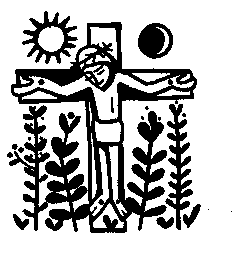
What mercy God showed to our race,
A plan of rescue by His grace:
In sending One from woman's seed,
The One to fill our greatest need--
For on a tree uplifted high
His only Son for sin would die,
To crush the ancient serpent's head!
Now from that tree of Jesus' shame 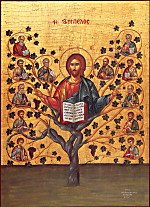
Flows life eternal in His name;
For all who trust and will believe,
Salvation's living fruit receive.
And of this fruit so pure and sweet
The Lord invites the world to eat,
To find within this cross of wood
The tree of life with ev'ry good.
LSB 561
Text: Stephen P. Starke, b. 1955
Tune: BruceW. Becker, b. 1952; Henry V. Gerike, b. 1948
And Behold...it is Good!
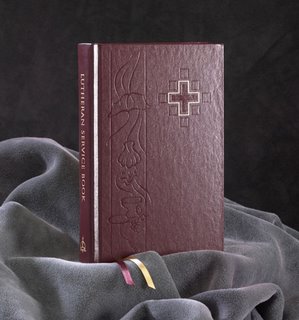
So, let me give you a glimpse into many of my converstaions with my dear and wonderful wife:
Me: Baby, you've got to see this cool cross/liturgical doo-dad/book/icon! Isn't it the coolest thing ever?!?
My Wife: (Somewhat exasperated and suspicious) Yeah, it's ok, why do you ask?
Me: I really want to get it and it's only so much, I really need it, can I get it?
My Wife: (sighs) Do you REALLY NEED another cross/liturgical doo-dad/book/icon? I mean, our small apartment is already filled, do you really NEED another thing?
Me: (conceding) You're right. (sighs) I guess I don't REALLY NEED it, but it's so cool!
My Wife: I know, Baby. Maybe later.
I thank God for a wife that is so fiscally conservative and is willing to tell her adorable and persuasive husband "no" when he needs to hear it.
However, this time I had a real reason! The Lutheran Service Book!! I have to know what's going on with our new hymnal, and my wife, although somewhat reluctantly, saw the wisdom in this and agreed that it would be good for us to have a copy.
What can I say about this fantastic new hymnal? I mean, it's beautifully put together, it has a big variety of service options, it just could not be any better in my humble opinion! I love it!
When I first opened it, I fully expected a choir of angels to starting singing and light to eminate from its pages (that is how excited I was about getting it!) I know, and I embrace my dorkiness in this area. So there is no need for comments about it! If your church is considering adopting this new hymnal, encourage it, if your church needs new hymnals, get this one! Also, the book Worshiping with Angels and Archangels: An Introduction to the Divine Service is an excellent and very reasonably priced resource to go along with the new hymnal. Check them both out, and for heaven's sake, get excited about Lutheran Worship!
Monday, August 21, 2006
Fall Classes
Here are my fall classes with descriptions:
Exodus and Torah
This course consists of two related parts: (1) an overview of the first five books of the Old Testament in which topics of an isagogical nature will be discussed; (2) an exegetical study of selected sections of Exodus on the basis of the Hebrew text.
Pastor as Counselor
Theoretical and practical consideration of counseling foundations, techniques, and practices as these pertain to parish and institutional ministries, with a view toward developing a personal methodological approach to pastoral counseling for individuals and families which integrates the Law/Gospel principle.
European Lutheranism
Continental and Scandinavian Lutheranism prior to the Prussian Union of 1817 and its ramifications and consolidation during the 19th and 20th centuries. Special emphasis: theology, missions, and church-state relations.
Christology
The work and person of Christ according to Scripture. The Christological problems and conclusions of the early church. The Christology of the Reformation. The modern discussion in Christology.
Byzantine Theology
A study of the Eastern Orthodox churches in the context of their history and church life, based on readings in ancient and contemporary Orthodox writers, with special focus on the doctrines of God, salvation, and the church.
Sunday, August 20, 2006
Where's the...GOSPEL?!?

Remember those comercials from the 80's with that little old lady asking "Where's the beef?" I have a vague memory of them, I was a wee lad in the 80's, but I do remember that we had this really dorky beach towel that said "Where's the beef?" on it.
Well, being back in St. Louis, there is a wide variety of churches to pick from. My lovely wife and I went to one today (of which I will not name names) and were very, very disappointed by the sermon. The preacher talked for 25 minutes about the dangers of getting caught up in sin. How it sneaks up on you, how we need to avoid it at all costs, and going into great and graphic (and, I thought, inappropriately violent) accounts of sinful actions. His point was that sin sneaks up on us unawares, that we are powerless against it and that despite our best intentions, we fall victim to the ravages of sin. All very well, but what are we to do? This sermon was terribly short on the beauty and safety of the gospel. Christ was mentioned, I'll give him that, but in such small amounts and comparatively of such little importance that all my wife and I left with was a feeling of impending doom.
What was even more discouraging is that this message was from a seasoned retired pastor, who, in my humble opinion, should have known better. It is a tragedy when a minister of the Gospel of Jesus Christ focuses solely on clever stories, illustrations and the sinful life. Unfortunately, it has been my experience that many (not all, but many) retired ministers in the LCMS are prone to preaching in this way. It is as if they are above the gospel, that they have lived such lives of service and have had so much experience that they cannot be held down or bound to the gospel alone. This is very sad and somewhat discouraging for me as a young man just about to begin a life of service to the precious Word.
Do you, my dear readers, have any thoughts on this? Have you seen similar things? Are we to just sit back and take this kind of disservice of the gospel? What is to be done if anything?
I have learned that one must never assume the Gospel of Christ!
WHERE'S THE GOSPEL?!?
Friday, August 18, 2006
A Good Reason to STAY REFORMED!!

Ok, I'm not a big news guy. Pretty much all I get is whatever my Yahoo! page notes as important. This is one of those stories that was Yahoo!'s "top news stories" of the day. In my opinion, its a good reason to keep a healthy distance from the folly of Rome, as well as a real threat to the chocolate Easter Bunny cartel.
The main question in all of these stories, and for Catholicism in general, "Where's Christ?"
I know your popery arguments for praying to the Blessed Virgin and other Saints, but it is just not biblical. I know that your intentions are good and your desire to honor holy things, but remember, "the intention of man's heart is evil from his youth,"(Gen. 8:21) and
"Forever, O LORD, your word is firmly fixed in the heavens."(Psalm 119:89).
I can see nowhere in God's Word where He has told us to look to his lowly handmaiden in chocolate.
Saturday, August 05, 2006
An open question...

Ok, I mean this in all seriousness and I hope to get a lot of responses to this. To all my readers, lay and clergy, why are you Lutheran? More specifically, why are you Missouri Synod Lutheran? This is something I have often wondered about when I hear about extremes within our synod, both liberal and conservative. So, if you are reading this and are Missouri Synod Lutheran, please tell me why you are. Be as specific as possible!
What a week!!
To my dear brothers and sisters in Hamilton, thank you for everything! You will always hold a dear place in my heart because of your kindness, hospitality, love and faith. May God richly bless you as His people and may you ever grow in love and charity towards one another. The Lord has begun a good work in you and He is faithful to bring it to completion!
The Lord be with you!
Saturday, July 22, 2006
"You can be whatever you want to be when you grow up!"
Unfortunately, the intent of these words does not carry the same weight as the words themselves. I mean, really, think about what is being said: “whatever you want!” It sounds great, doesn’t it? I mean, talk about a boost to the ol’ self-esteem. So you were born on the wrong side of the tracks… “whatever you want!” So you were born with a physical or mental handicap... “whatever you want!” So you were born to crack addict parents… “whatever you want!” Ah, the siren call of postmodernism! It's alluring, isn’t it? I mean, come on, who doesn’t want to grow up to be whatever they want? When I was a kid, this mantra was pumped into my brain almost non-stop. I wanted to be a Teenage Mutant Ninja Turtle, for crying out loud!! The first time I went to a big city with manhole covers I was really excited because I thought that if I looked really hard I could find some radioactive goo that would turn me into a mutated super-hero.
Are you starting to see one of the problems with this slogan of the Baby Boomers? First off, how can any of us really know what we want? (I love using postmodern ideas to fight postmodernism!) I mean, as a child, are we really able to rightly gauge our wants and desires? Are we able to do so realistically? NO!
Secondly, as Christians, is this a theology we need to endorse, let alone grasp onto? God says of man “the intention of man's heart is evil from his youth.” (Genesis 8:21). So, do we need to go around telling young Christians, whose intent is evil, to follow that intent? Does God’s Word uphold this antiphon of postmodernism or condemn it?
A theology that is centered on the cross of Christ says that we will bear crosses, we will be persecuted, we will be strangers in a strange land, we will partake in a death like Christ’s. A theology of the cross says deny yourself, take His yoke, become a leaf to His vine. A theology of the cross says quite the opposite of “you can be whatever you want to be.” A theology of the cross says, “You are wicked and evil to your core from your youth. You can be nothing other than that in yourself. But I will make you a prince of heaven. I will save you from yourself; I will do it all because I love you because you are unlovable! I love you with an everlasting and sacrificial love, I love you enough to die for you and wash you with My holy blood! You are redeemed and are Mine! You will be what I have ordained you to be!”
We have seen the fruits of this rotten vine, men can be women, women can be men, people who have no business in positions of leadership have been given it, because, after all, they can be what they want to be! Children are confused and parents are frustrated. “Sure, I told him he could be whatever he wanted to be, but I certainly didn’t mean he could be a dope addict!” “Yeah, I told her she could go and do whatever her imagination would allow; I just never thought her imagination would take her to a street corner!”
“The intention of man’s heart is evil from his youth.” Don’t encourage that evil, but rather “train up a child in the way he should go; even when he is old he will not depart from it.”
Don’t just settle for “whatever you want;" be what God has made you in Christ!
